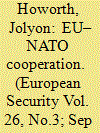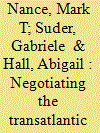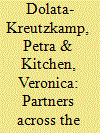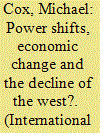|
|
|
Sort Order |
|
|
|
Items / Page
|
|
|
|
|
|
|
| Srl | Item |
| 1 |
ID:
154469


|
|
|
|
|
| Summary/Abstract |
The re-launch of the EU’s security and defence project in the wake of Brexit and the election of Donald Trump has focused the spotlight on the relationship between NATO and the EU. This article reviews the detailed aspects of that relationship as studied in the various contributions to this special issue. It argues that, over and above cooperation on the ground, the key issue to be addressed, which is usually skated over in the “big picture” literature on this question, is: where is all this heading? Is there a move towards a clear EU–NATO division of labour (if so, will it be geographic or functional?); or are the allies seeking a radical new balance of responsibilities and commitment as between the US and the Europeans for the stabilisation of the European neighbourhood? The paper argues that EU “strategic autonomy”, as called for in the Global Strategy document of 2016, can only be achieved through the Europeanisation of NATO itself.
|
|
|
|
|
|
|
|
|
|
|
|
|
|
|
|
| 2 |
ID:
141279


|
|
|
|
|
| Summary/Abstract |
This article examines how, in a global strategic context presided by the rise of Asia and the US rebalance towards that region, Europeans are contributing to transatlantic burden-sharing—whether individually or through the EU/NATO. As Asian powers reach westward and the US shifts its strategic priorities eastward, classical geostrategic delimitations become gradually tenuous. Particularly important are the ‘middle spaces’ of the Indian Ocean, central Asia and the Arctic, in that they constitute the main avenues of communication between the Asia–Pacific and the European neighbourhood. The article seeks to understand how evolving geostrategic dynamics in Europe, the ‘middle spaces’ and the Asia–Pacific relate to each other, and how they might impinge on discussions on transatlantic burden-sharing. It is argued that the ability of Europeans to contribute to a more equitable transatlantic burden-sharing revolves around two main tenets. First, by engaging in the ‘middle spaces’, Europe's key powers and institutions are helping to underpin a balance of power in these regions. Second, by stepping up their diplomatic and economic role in the Asia–Pacific, strengthening their security ties to (US) regional allies and maintaining an EU-wide arms embargo on China, Europeans are broadly complementing US efforts in that key region. There are a number of factors that stand in the way of a meaningful European engagement in the ‘middle spaces’ and the Asia–Pacific, including divergent security priorities among Europeans, the impact of budgetary austerity on European defence capabilities and a tendency to confine foreign policy to the immediate neighbourhood. The article discusses the implications of those obstacles and outlines some ways in which they might be overcome.
|
|
|
|
|
|
|
|
|
|
|
|
|
|
|
|
| 3 |
ID:
086496


|
|
|
|
|
| Publication |
2009.
|
| Summary/Abstract |
There are growing differences in the way the transatlantic partners assess each other. While Europe has embraced Barack Obama as an "American European," America is looking for strategic partners in other corners of the globe. If Europe wants to be taken seriously, it must decide to become a meaningful actor.
|
|
|
|
|
|
|
|
|
|
|
|
|
|
|
|
| 4 |
ID:
146828


|
|
|
|
|
| Summary/Abstract |
This article analyzes the effectiveness of an international, interdisciplinary simulation of an ongoing trade negotiation. It thoroughly describes the simulation, provides links to background information for public use, and offers suggestions on ways to further strengthen the learning outcomes achieved.
|
|
|
|
|
|
|
|
|
|
|
|
|
|
|
|
| 5 |
ID:
085818


|
|
|
|
|
| Publication |
2008.
|
| Summary/Abstract |
As the transatlantic relationship moves further away from the cold war context that defined it for many years, it also becomes, by definition, less of an exclusive relationship.
|
|
|
|
|
|
|
|
|
|
|
|
|
|
|
|
| 6 |
ID:
181578


|
|
|
|
|
| Summary/Abstract |
The cultural revival of transatlanticism after Donald Trump is shadowed by overlapping difficulties.
|
|
|
|
|
|
|
|
|
|
|
|
|
|
|
|
| 7 |
ID:
119269


|
|
|
|
|
| Publication |
2012.
|
| Summary/Abstract |
It has become the new truth of the early twenty-first century that the Western world we have known is fast losing its pre-eminence to be replaced by a new international system shaped either by the so-called BRICs comprising Brazil, Russia, India and China, the 'rest', or more popularly by that very broadly defined geographical entity known as Asia. This at least is how many economists, historians and students of world politics are now viewing the future of the larger international system. This essay does not dispute some self-evident economic facts. Nor does it assume that the world will look the same in 50 years time as it does now. It does, however, question the idea that there is an irresistible 'power shift' in the making and that the West and the United States are in steep decline. Specifically, it makes a number of critical arguments concerning the new narrative. First, it suggests that this story, by reasonably focusing on what is obviously changing in the world, unfortunately ignores what is not; as a result, it underestimates what might loosely be termed the continued structural advantages still enjoyed by the United States and its major Western allies. Second, while it is true that many new states are assuming a bigger role in the world economy, their rise needs to be looked at more carefully than it has been so far; indeed, when such an examination is undertaken, it becomes increasingly clear that the rise of others - including China - is still hemmed in by several obstacles, internal as well as external. Third, though the Asian region, and China as part of it, is assuming an ever more important role in the wider world economy, this development should not be seen as marking the beginning of a new Asian Century. This now popular idea is not only conceptually problematic, it inevitably leads to an underestimation of other key areas in the world including incidentally the Transatlantic region. Finally I suggest that if the dubious idea of a power shift is taken to be true, this could very easily lead to greater international insecurity and conflict. Understanding the modern world better than many seem to be doing right now is therefore not only intellectually important; it is strategically necessary too.
|
|
|
|
|
|
|
|
|
|
|
|
|
|
|
|
| 8 |
ID:
086308


|
|
|
|
|
| Publication |
2008.
|
| Summary/Abstract |
As recently as few years ageo, many analysts of NATO and transatlantic relations implied that the disagreements between United States and several of its key long term European allies were but the most recent example of a process of disagreements that had been occuring since the very creation of the NATO alliance itself.
|
|
|
|
|
|
|
|
|
|
|
|
|
|
|
|
|
|
|
|
|